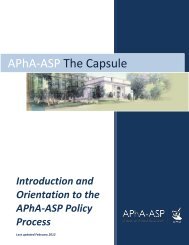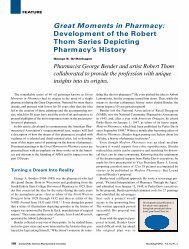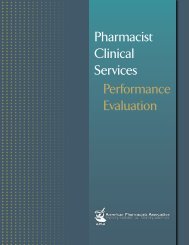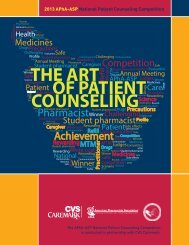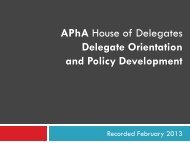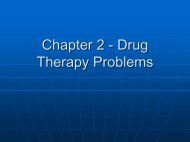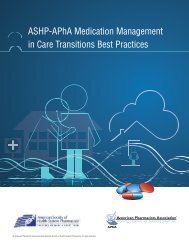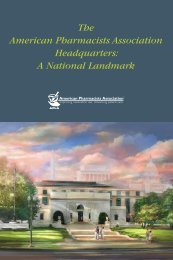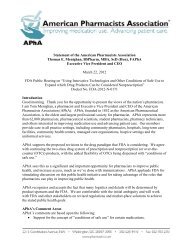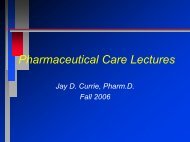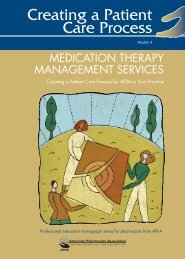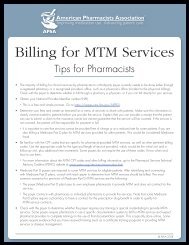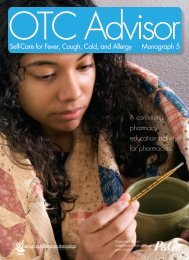Community Pharmacist Preceptor Education Program - Library
Community Pharmacist Preceptor Education Program - Library
Community Pharmacist Preceptor Education Program - Library
- No tags were found...
You also want an ePaper? Increase the reach of your titles
YUMPU automatically turns print PDFs into web optimized ePapers that Google loves.
TABLE 2. Sample Responsibilities of aProfessional Experience <strong>Program</strong> DirectorThe director provides oversight for planning andimplementation of experiential education programs.Activities required include:■ Developing and overseeing operational andeducational aspects of the experiential educationprogram.■ Establishing and overseeing experiential educationschedules for students.■ Developing and implementing continuous qualityimprovement programs for introductory andadvanced pharmacy practice experiences.■ Maintaining a manual of policies and procedures forexperiential education programs.■ Identifying new preceptor sites and helping theirdevelopment and management.■ Managing the staff, budget, and technology of theexperiential education office.■ Serving as a liaison between faculty, staff, andstudents in matters involving experiential education.■ Managing communications related to experientialeducation.■ Overseeing and assisting with creation of rotationobjectives for each rotation.■ Organizing and overseeing a comprehensivepreceptor development program.Source: Reference 5.care professionals to support development of these skillsby student pharmacists. A discussion of how to supportstudents’ development of communication skills is providedlater in this program.Regular communication with the student pharmacistis essential to the rotation experience. For example,adequately communicating your expectations of studentpharmacists during their orientations is fundamental tostart the rotation on the right track. Positive reinforcementand constructive criticism are cornerstones of learning ina practice environment, and it is important to maintainopen channels of communication with your studentpharmacist to provide ongoing guidance and prevent orresolve misunderstandings. Ideally, informal feedbackshould be provided continually, and there should bestructured time throughout the rotation for more formaldebriefings. Specific strategies are provided in the Feedbackand Assessment section of this program.Selected materials that support the development ofcommunication skills for pharmacists are listed in theResources.Conflict Management<strong>Preceptor</strong>s need to possess conflict management skills,and be prepared to teach student pharmacists to use them. 8<strong>Preceptor</strong>s have a uniquely powerful position to model suchskills for student pharmacists.Conflict is an inevitable component of virtually allwork experiences. Stress and negative emotions are apart of being human, and may arise frequently in highpressureenvironments, such as a community pharmacy.Disagreements may occur with patients, pharmacy staff,student pharmacists, and other members of the health careteam. Conflict can arise for many reasons, including poorcommunication, seeking control, or redirection of negativefeelings from another situation.To adequately resolve a conflict, parties need tocommunicate their grievances and reach a mutuallyagreeable solution. Good listening skills should be used totry to understand the nature of the conflict. Asking those onthe other side to explain their perspective first and givingthem the opportunity to feel truly listened to can helpdefuse tensions and may make them more open to calmlylistening to your point of view. Many different skills can beused to address conflict situations (Table 4). 8 Applicationof these skills can be used not only to resolve issues withprescribers and patients, but also to resolve issues withstudent pharmacists and among other pharmacy staff.To help students develop such skills during rotations,you can point out conflict situations, discuss the feelingsthat arose, review how the situation was resolved, andbrainstorm additional strategies that could have improvedthe outcome or avoided the clash in the first place.Because conflict can arise for a myriad of reasons,there is no single way to resolve all discord. In fact, someconflicts may never be resolved. Rather, the parties involvedmay need to “agree to disagree” to maintain a positiveworking relationship. (Such a situation may arise if thepharmacist disagrees with a prescriber’s interpretation ofa clinical situation, even after both parties have explainedtheir positions.)Worksheet 2 provides several conflict situations thatmay arise during a rotation and allows you to brainstormpossible solutions. If you find yourself faced with asituation with your student pharmacist that you’re notsure how to handle, you can consult with someone in theschool’s office of experiential education. They may haveexperience with similar situations and have suggestionsfor how to manage it, or be able to direct you to otherpreceptors who have worked through the same issue.Cultural CompetenceStudent pharmacists must be prepared to address issuesthat arise when working with an increasingly diverse patientpopulation and workforce. Thus, it is important for preceptorsto possess and promote cultural competence skills.Cultural differences may arise from factors suchas age, race, ethnicity, and emerging health care trends.6 APhA and NACDS Foundation



